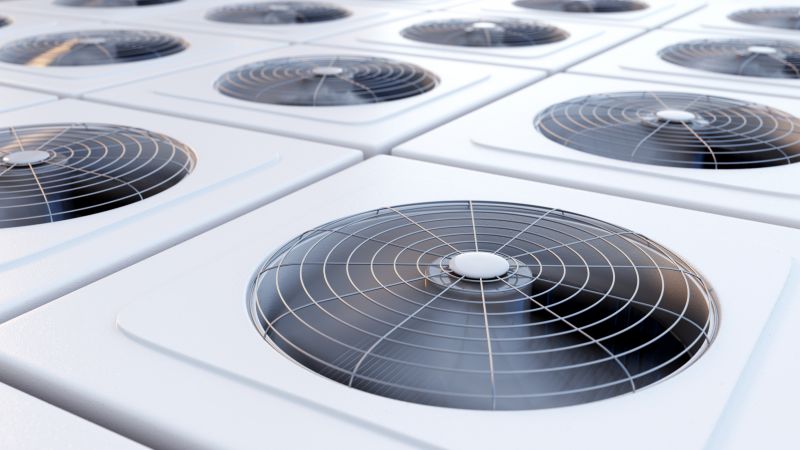Top Products For Geothermal AC Unit Installations To Enhance Efficiency
Discover essential equipment and tools that ensure smooth geothermal AC installations with optimal performance and durability.
 Installing a geothermal air conditioning system involves multiple components that work together to provide efficient climate control. The process begins with the installation of ground loops, which are buried underground to extract or dissipate heat. These loops can be configured in various ways, including horizontal, vertical, or pond/lake loops, depending on the available space and geological conditions. Connecting these loops to the indoor unit requires durable and reliable piping systems, which are essential for maintaining system integrity and performance.
Installing a geothermal air conditioning system involves multiple components that work together to provide efficient climate control. The process begins with the installation of ground loops, which are buried underground to extract or dissipate heat. These loops can be configured in various ways, including horizontal, vertical, or pond/lake loops, depending on the available space and geological conditions. Connecting these loops to the indoor unit requires durable and reliable piping systems, which are essential for maintaining system integrity and performance.
Top Overall Option
Ground Loop Piping System
A high-quality ground loop piping system is fundamental for effective heat transfer in geothermal AC installations. It provides a durable, corrosion-resistant conduit for circulating the fluid that exchanges heat with the ground. Properly designed and installed piping ensures efficient energy transfer and long-term system reliability. Selecting a piping system with flexible, weather-resistant materials can help accommodate ground movement and temperature variations, contributing to the overall performance of the geothermal system.
Types of Products For Geothermal Ac Unit Installations
Horizontal Ground Loop Systems
Horizontal loops are installed in trenches and are suitable for properties with ample land area. They are typically more accessible for installation and maintenance.
Vertical Ground Loop Systems
Vertical loops are installed in boreholes and are ideal for limited space situations. They require specialized drilling equipment but can be more efficient in certain geological conditions.
Pond/Lake Loop Systems
These systems utilize bodies of water to exchange heat and are a good option when available. They involve submerging coils or pipes in the water body.
Heat Pump Units
Indoor heat pumps are the core components that transfer heat between the ground loop and the interior space, available in various capacities.
Insulated Piping and Connectors
Specialized piping and fittings designed to withstand underground conditions and prevent heat loss.
Flow Control Valves
Valves that regulate the flow of fluid within the ground loops, ensuring optimal system performance.
Expansion Tanks
Components that accommodate volume changes in the fluid due to temperature fluctuations, maintaining system pressure.
Water Treatment Supplies
Products to prevent mineral buildup and corrosion within the loop system, extending its lifespan.
Thermostats and Zone Controls
Devices that allow precise temperature regulation and zoning within the building.
Filtration Systems
Filters that improve indoor air quality and protect the heat pump components.
Popular Choices
Complete kits for horizontal loop installation suitable for larger properties.
Pre-packaged vertical loop systems designed for quick installation in limited spaces.
Corrosion-resistant piping that is easy to install and adapt to various ground conditions.
Indoor units designed for reliable heat transfer and energy efficiency.
Weatherproof fittings that ensure secure connections in underground environments.
Valves that help optimize fluid flow and system balancing.
All-in-one solutions for maintaining clean and efficient ground loop systems.
Advanced controls for precise temperature management and energy savings.
Chemical treatments to protect the system from common underground issues.
Systems that allow multiple zones to be heated or cooled independently.
The indoor component typically includes a heat pump unit, which transfers heat between the ground loop and the interior space. Proper insulation and sealing are critical to prevent energy loss and ensure optimal operation. Additional accessories such as thermostats, zone controls, and filtration systems help customize and optimize the system for different building sizes and usage patterns. When selecting products for geothermal AC installation, compatibility and quality are key factors that influence overall system efficiency and longevity.
Maintenance products also play a vital role in keeping the system running smoothly over time. These include corrosion inhibitors, water treatment supplies, and filter replacements, which help prevent common issues like mineral buildup and bacterial growth. It is important to choose components that are designed specifically for geothermal applications to ensure durability and performance. Investing in high-quality, compatible products can contribute significantly to the system's reliability and energy efficiency.
Overall, a successful geothermal AC installation depends on selecting the right combination of ground loops, piping, heat pumps, and accessories. Proper planning, professional installation, and ongoing maintenance are essential to maximize the benefits of geothermal cooling and heating systems. Whether you are upgrading an existing system or installing a new one, understanding the key product options and considerations can help you make informed decisions for a long-lasting, effective setup.
Key Buying Considerations
- Compatibility with existing or planned geothermal systems
- Material durability and resistance to underground conditions
- Appropriate size and capacity for your property’s heating and cooling load
- Ease of installation and maintenance requirements
- Corrosion and mineral buildup resistance features
- Availability of replacement parts and accessories
- Compatibility with control and zoning systems
- Ground type and geological conditions affecting loop design
- System efficiency ratings and energy performance
- Size and footprint of ground loop components
- Local regulations and permitting requirements
- Warranty and manufacturer support
- Cost considerations including installation and ongoing maintenance
- Environmental factors that may impact system longevity
- Ease of integration with existing HVAC infrastructure
